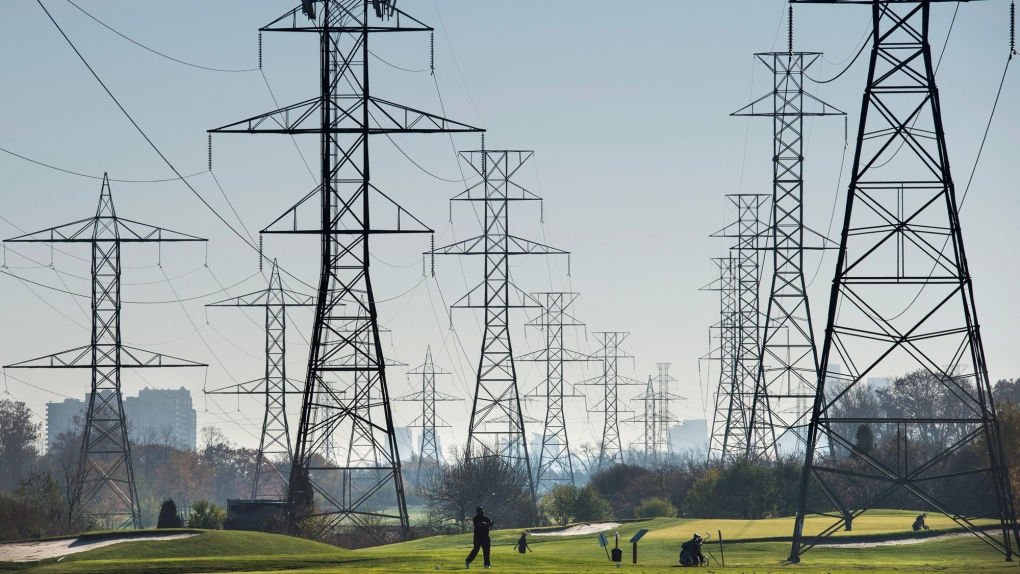Hydro capacity 'tightness' could cause energy shortfalls in Ontario this summer, report warns
 Hydro towers are seen over a golf course in Toronto on Wednesday, Nov. 4, 2015. (The Canadian Press/Darren Calabrese)
Hydro towers are seen over a golf course in Toronto on Wednesday, Nov. 4, 2015. (The Canadian Press/Darren Calabrese)
The early spring heatwave in Ottawa brought something we may be seeing more of as the summer heats up: power failures.
Ontario’s electricity grid could be in a precarious spot, especially when demand spikes in a heat wave, according to a new report.
A North American electricity regulator says Ontario is the only province in Canada that is at risk of an energy shortage, which means power outages.
"That’s all because of the tightness of the capacity situation in Ontario and that’s mainly driven by four nuclear units that are out for fairly significant refurbishment," said Jim Robb, president of the North American Electric Reliability Corporation.
Robb says nuclear refurbishment at a number of sites, including Darlington, are a factor but there are risks to the province’s energy shortage including the province’s growth.
"What has been problematic for Ontario is that the IESO (Independent Electricity System Operator) has been looking to add capacity to the system and soliciting for new construction, but the response to that hasn’t been as robust as they had hoped," Robb said.
"Plus electrification policies that are starting to kick in, we are seeing those effects starting to kick in."
The situation is problematic as Ontarians get ready to crank the air conditioning this summer.
"If we find ourselves in a situation where we are in a heat wave, a one in ten year hot weather event, that becomes problematic," Robb said. "The biggest risk for Ontario this summer is if there is a heat dome, like we have seen form over the west over the last several summers. If a heat dome formed that encompassed both parts of Quebec and a large part of Ontario, you could find it very difficult to import the power that you need."
Robb said that’s the scenario that would lead to rotating outages.
Meanwhile, experts say there shouldn’t be a widespread outage like the blackout of 2003.
"The grid today is in much better shape today than it was 20 years ago, there’s been significant investments, which makes an outage like that much more unlikely," said Tom Chapman, an energy economist with the Brattle Group. "You can never rule it out but it’s certainly much more unlikely."
The NDP believes funding cuts to renewable projects are partially to blame for the regulator's findings. The Minister of Energy pushed back, saying the province's system is 90 per cent clean and attracting investments from around the world.
CTV News Ottawa reached out to Hydro Ottawa for comment, but did not hear back before publishing.
On June 1, thousands of customers in Ottawa's west end lost power during the hottest day of the year.
Hydro Ottawa blamed a strain on the system for the outages, caused by people turning on air conditioners.
CTVNews.ca Top Stories

Quebec nurse had to clean up after husband's death in Montreal hospital
On a night she should have been mourning, a nurse from Quebec's Laurentians region says she was forced to clean up her husband after he died at a hospital in Montreal.
Cuban government apologizes to Montreal-area family after delivering wrong body
Cuba's foreign affairs minister has apologized to a Montreal-area family after they were sent the wrong body following the death of a loved one.
What is changing about Canada's capital gains tax and how does it impact me?
The federal government's proposed change to capital gains taxation is expected to increase taxes on investments and mainly affect wealthy Canadians and businesses. Here's what you need to know about the move.
'Anything to win': Trudeau says as Poilievre defends meeting protesters
Prime Minister Justin Trudeau is accusing Conservative Leader Pierre Poilievre of welcoming 'the support of conspiracy theorists and extremists,' after the Conservative leader was photographed meeting with protesters, which his office has defended.
Northern Ont. lawyer who abandoned clients in child protection cases disbarred
A North Bay, Ont., lawyer who abandoned 15 clients – many of them child protection cases – has lost his licence to practise law.
Boeing's financial woes continue, while families of crash victims urge U.S. to prosecute the company
Boeing said Wednesday that it lost US$355 million on falling revenue in the first quarter, another sign of the crisis gripping the aircraft manufacturer as it faces increasing scrutiny over the safety of its planes and accusations of shoddy work from a growing number of whistleblowers.
Bank of Canada officials split on when to start cutting interest rates
Members of the Bank of Canada's governing council were split on how long the central bank should wait before it starts cutting interest rates when they met earlier this month.
Fair in Ontario, flurries in Labrador: Weather systems make for an erratic spring
"It's a bit of a complicated pattern; we've got a lot going on," said Jennifer Smith of the Meteorological Service of Canada in an interview with CTVNews.ca on Wednesday. "[As is] typical with weather, all of these things are related."
Police tangle with students in Texas and California as wave of campus protest against Gaza war grows
Police tangled with student demonstrators in Texas and California while new encampments sprouted Wednesday at Harvard and other colleges as school leaders sought ways to defuse a growing wave of pro-Palestinian protests.































